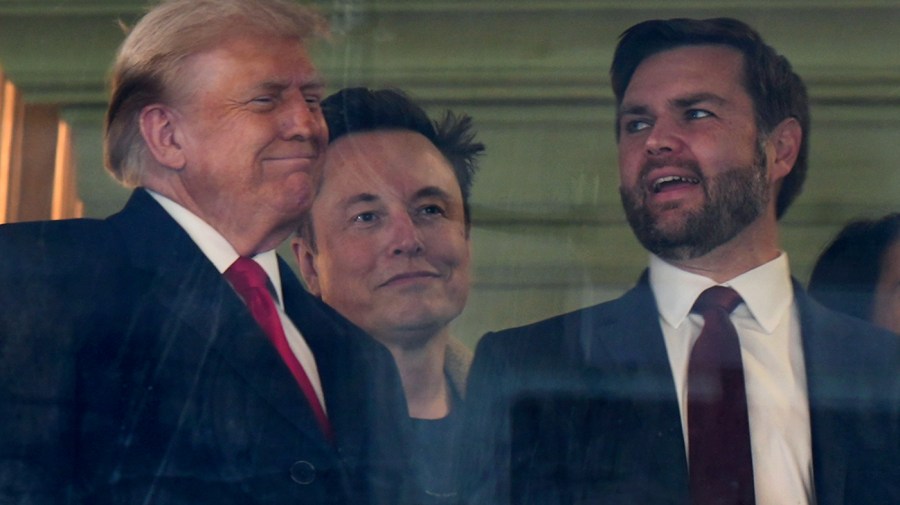
Eliminating government agencies should be DOGE’s last job, not its first. This may sound heretical to some, but doing the reverse is akin to following the advice of those navel-gazers who once called for unilateral nuclear disarmament. The agencies could — and should be made to — be just as powerful a tool for reforming government as they were in building it up.
First, to DOGE’s naysayers: Simply maintaining the status quo is not an option. The federal government is on an unsustainable trajectory that demands reform.
According to the Congressional Budget Office, in fiscal year 2024: it spent $6.8 trillion — 23.4 percent of GDP, a 10 percent increase; it raised $4.9 trillion in taxes — 17.1 percent of GDP, an 11 percent increase; it ran a $1.8 trillion deficit — 6.4 percent of GDP, an 8 percent increase and debt held by the public was 98 percent of GDP.
In 10 years, on the current fiscal trajectory, federal government outlays will be 24.9 percent of GDP and in 30 years, 27.3 percent of GDP; in 10 years, its revenues will be 18 percent of GDP and in 30 years its revenues will be 18.8 percent. In 10 years, its debt will be 122.4 percent of GDP and in 30 years, 166 percent of GDP.
For comparison, over the last 50 years, as share of GDP, federal spending has averaged 21.1 percent, federal revenues 17.3 percent and the federal deficit 3.8 percent.
Big as these numbers are, they still do not capture the cost of the regulations and administrative actions — effectively invisible taxes — that the federal government imposes.
The question then, is not whether to reform the federal government, but how? DOGE is at the very least an overdue first step.
The tempting knee-jerk answer to overdue reform is to simply to do away with big agencies — the Department of Education being routinely mentioned. That this would be difficult is true, but difficulty is an inadequate excuse for not doing this; many things worth doing are difficult.
The better answer is that immediately doing away with big government agencies is counterproductive to long-term reform. Having wrested the federal government away from big government advocates, DOGE should harness the bureaucracy it retains to enforce reform, not simply peremptorily discard it.
Changing how the federal government operates and spends, is as important to making it more efficient — and ultimately diminishing its negative impact — as reducing what the federal government spends. To start this process, all federal programs should be audited. The same should be done for federal regulations.
DOGE itself should not undertake this; doing so would mean recreating the wheel and diverting DOGE from important decision-making and directing executive action to immediately begin the reform process. Instead, outsiders — public (Government Accountability Office, Congressional Budget Office, and the Office of Management and Budget) and private (think tanks) groups — should be enlisted for their recommendations.
Agencies too could be part of this process — in fact, this would serve as a good litmus test of their seriousness about reform. After all, those who created, and administer, the programs and regulations should be versed in them.
Each agency should be tasked with examining what it does, how it does it, where its money goes, and the impact these have. Such an examination should include the ultimate recipients of resources: If private security is held accountable for its supply chain, the federal government should be no less accountable for its beneficiary chain. Who is receiving this federal money? To whom are they distributing it? How is it being used?
If taxpayers can be audited, government spenders and spending recipients should be too. After all, money misspent is as much a loss as money not collected — and the federal government spends far more than it takes in.
Those agencies — and employees — unable, or unwilling, to do such basic self-evaluation (routine benchmarking in the private sector) should move to the top of DOGE’s reform list.
The same should apply to federal regulations. Just because their impact is not calculated the way federal spending is doesn’t diminish their real economic impact.
This is not to say that decision-making over reforms and how they are to be accomplished should be turned over to the agencies themselves. Doing this would make no more sense than putting chickens under foxes’ supervision. Such ultimate decision-making is precisely what DOGE was designed for.
Federal agencies must also be tasked with ensuring that DOGE’s decisions are carried out. The same agencies now enforcing compliance with program requirements should enforce compliance with DOGE-determined reforms. Absent enforcement, the chances of reforms being implemented (and continued) are remote.
As the earlier Congressional Budget Office figures demonstrate, how the federal government currently operates is anything but costless. However, the true cost runs higher still; to truly measure it, we must also consider the foregone growth that this diversion of resources has cost America in private sector growth and the cost that underserved program recipients have incurred.
DOGE has an important task in diverting the federal government from its unsustainable fiscal trajectory. It will be far better able to do it if it uses all the tools at its disposal.
J.T. Young is the author of the new book, “Unprecedented Assault: How Big Government Unleashed America’s Socialist Left,” from RealClear Publishing. He has over three decades of experience working in Congress, the Department of Treasury, the Office of Management and Budget and representing a Fortune 20 company.












